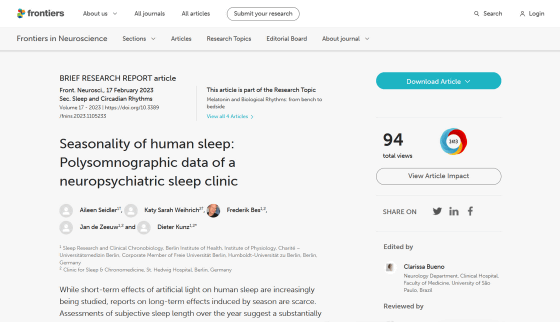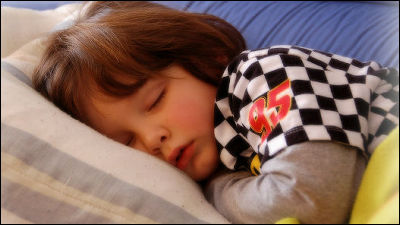Research results that humans may need more sleep than in summer in winter

On winter mornings, it's hard to find the energy to get out of bed, and I tend to oversleep. You might think it's because I'm lazy, but a study published in the journal
Frontiers | Seasonality of human sleep: Polysomnographic data of a neuropsychiatric sleep clinic
https://www.frontiersin.org/articles/10.3389/fnins.2023.1105233/full

Humans 'may need more sleep in winter', study finds | Sleep |
https://www.theguardian.com/lifeandstyle/2023/feb/17/humans-may-need-more-sleep-in-winter-study-finds
Do Humans Hibernate? No, but We Still Need More Winter Sleep
https://scitechdaily.com/do-humans-hibernate-no-but-we-still-need-more-winter-sleep/
New Study Suggests “Hibernating” During the Winter Might Be Good For Your Health
https://www.inverse.com/health/sleep-longer-hibernate-during-winter-human-health
Many animals change their behavior greatly depending on the season, and some mammals hibernate in winter. On the other hand, human behavior changes relatively little depending on the season, and social activities such as work and school do not change much between winter and summer. ``One of the most valuable achievements in human evolution may be the lack of seasonality at the behavioral level,'' said Dieter Kunz, a sleep researcher at St. Hedwig's Hospital in Berlin, Germany. increase.
A 2020 survey by the American College of Sleep Medicine found that 34% of adults in the United States said they sleep longer in the winter, while 36% said they sleep less in the summer. ”, suggesting that seasonal changes may occur in sleep. Although changes in sleep duration can be explained by changes in the amount of sunlight that regulates circadian rhythms, it is not only natural light that influences circadian rhythms, but also other factors such as indoor lighting and the light from electronic screens. The effects of seasons on sleep are ambiguous, as they can disrupt rhythms.
Therefore, Kunz and colleagues conducted a study of patients who underwent polysomnography over three nights at St. Hedwig Hospital to see if seasonality of sleep was observed in people living in urban environments. I was.
Polysomnography is a test to check the length and quality of sleep by measuring brain waves, breathing, eye movement, electrocardiogram, oxygen saturation, etc. while the patient is asleep. At St. Hedwig Hospital, we use a laboratory where subjects can sleep naturally without placing an alarm clock, and we regularly conduct polysomnography examinations for patients with sleep disorders.

From the 292 patients who underwent polysomnography at St. Hedwig Hospital in 2019, the research team excluded patients who were taking sleep-related drugs and those who had a light
In the graph below, the horizontal axis shows the data collection period (January to December 2019), and the vertical axis shows the subject's total sleep time (TST), REM sleep time (REM), and non-REM sleep time (SWS). what you showed. Looking at the total sleep time from May to June, it is about 60 minutes less than the peak time in winter, and REM sleep time is longer in winter than in summer, and in autumn, memory and immune function are affected. You can see that the amount of time spent in critical non-REM sleep is decreasing. According to the research team, the seasonal change in total sleep time was not statistically significant, but the change in REM sleep time was statistically significant.

Dr. Kunz says, ``Human physiology declines in winter, and in February and March you feel like you're spinning. 'We need to adjust our school and work schedules seasonally to meet our sleep needs.'
In addition, the results of this research were only performed in a small group of people experiencing sleep disorders, and it is necessary to reproduce the experiment in a larger group in the future.

Related Posts:
in Science, Posted by log1h_ik







